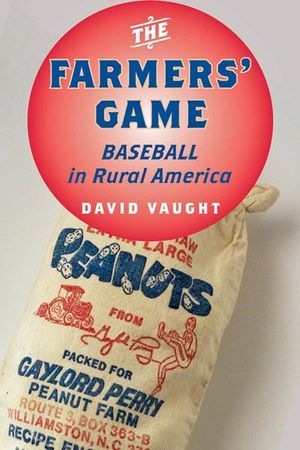The Farmers' Game
Published by Johns Hopkins University Press
A journey through the national pastime’s roots in America’s small towns and wide-open spaces: “An absorbing read.” —The Tampa Tribune
In the film Field of Dreams, the lead character gives his struggling farming community a magical place where the smell of roasted peanuts gently wafts over the crowded grandstand on a warm summer evening, just as the star pitcher takes the mound. In The Farmers’ Game, David Vaught examines the history and character of baseball through a series of essay-vignettes—presenting the sport as essentially rural, reflecting the nature of farm and small-town life.
Vaught does not deny or devalue the lively stickball games played in the streets of Brooklyn, but he sees the history of the game and the rural United States as related and mutually revealing. His subjects include nineteenth-century Cooperstown, the playing fields of Texas and Minnesota, the rural communities of California, the great farmer-pitcher Bob Feller, and the notorious Gaylord Perry.
Although—contrary to legend—Abner Doubleday did not invent baseball in a cow pasture in upstate New York, many fans enjoy the game for its nostalgic qualities. Vaught’s deeply researched exploration of baseball’s rural roots helps explain its enduring popularity.
In the film Field of Dreams, the lead character gives his struggling farming community a magical place where the smell of roasted peanuts gently wafts over the crowded grandstand on a warm summer evening, just as the star pitcher takes the mound. In The Farmers’ Game, David Vaught examines the history and character of baseball through a series of essay-vignettes—presenting the sport as essentially rural, reflecting the nature of farm and small-town life.
Vaught does not deny or devalue the lively stickball games played in the streets of Brooklyn, but he sees the history of the game and the rural United States as related and mutually revealing. His subjects include nineteenth-century Cooperstown, the playing fields of Texas and Minnesota, the rural communities of California, the great farmer-pitcher Bob Feller, and the notorious Gaylord Perry.
Although—contrary to legend—Abner Doubleday did not invent baseball in a cow pasture in upstate New York, many fans enjoy the game for its nostalgic qualities. Vaught’s deeply researched exploration of baseball’s rural roots helps explain its enduring popularity.
BUY NOW FROM
COMMUNITY REVIEWS

